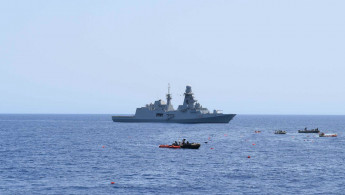From Libya to Europe: Italian navy begins controversial mission to curb flow of refugees
The mission was announced last week, when Italy said that the assistance was requested by Libya's UN-backed government.
2 min read
So far in 2017, around 2,230 people have died undertaking the perilous sea journey [Getty]
Italy's navy began a mission on Wednesday to assist Libya's coastguard in curbing the flow of people undertaking the perilous sea journey to Europe.
The limited mission, which kicked off with an Italian patrol boat heading towards the port of Tripoli, began within minutes of Italy's parliament approving the deployment.
"(We will) provide logistical, technical and operational support for Libyan naval vessels, helping them and supporting them in shared and coordinated actions," Italian Defence Minister Roberta Pinotti said ahead of Wednesday's vote.
"There will be no harm done or slight given to Libyan sovereignty, because, if anything, our aim is to strengthen Libyan sovereignty," she added, emphasising that Italy was not intending on imposing a blockade on the Libyan coast.
The mission was announced last week, when Italy said that the assistance was requested by Libya's UN-backed government.
While Italy has said that the move is aimed at stemming flows to Europe, it has drawn criticism from rights groups, who say that it will further endanger the lives of people.
"After years of saving lives at sea, Italy is preparing to help Libyan forces who are known to detain people in conditions that expose them to a real risk of torture, sexual violence, and forced labour," Human Rights Watch said in a statement.
The mission has also drawn opposition within Libya, where activists in Tripoli hung resistance hero Omar al-Mukhtar in the capital city's main square, accompanied by the words "No to a return to colonisation".
Mukhtar, who fought against Italian colonial forces in the early twentieth century, was executed by Italian forces after being captured.
Factions opposed to Libya's Tripoli-based government also voiced their opposition to the Italian operation.
The limited mission, which kicked off with an Italian patrol boat heading towards the port of Tripoli, began within minutes of Italy's parliament approving the deployment.
"(We will) provide logistical, technical and operational support for Libyan naval vessels, helping them and supporting them in shared and coordinated actions," Italian Defence Minister Roberta Pinotti said ahead of Wednesday's vote.
"There will be no harm done or slight given to Libyan sovereignty, because, if anything, our aim is to strengthen Libyan sovereignty," she added, emphasising that Italy was not intending on imposing a blockade on the Libyan coast.
The mission was announced last week, when Italy said that the assistance was requested by Libya's UN-backed government.
While Italy has said that the move is aimed at stemming flows to Europe, it has drawn criticism from rights groups, who say that it will further endanger the lives of people.
"After years of saving lives at sea, Italy is preparing to help Libyan forces who are known to detain people in conditions that expose them to a real risk of torture, sexual violence, and forced labour," Human Rights Watch said in a statement.
 |
After years of saving lives at sea, Italy is preparing to help Libyan forces who are known to detain people in conditions that expose them to a real risk of torture, sexual violence, and forced labour |  |
Mukhtar, who fought against Italian colonial forces in the early twentieth century, was executed by Italian forces after being captured.
Factions opposed to Libya's Tripoli-based government also voiced their opposition to the Italian operation.
General Khalifa Haftar, a Gadaffi-era military commander who currently leads a military force opposed to the Tripoli government, ordered his troops to repel "any naval vessel that enters national waters without permission from the army," according to the official Facebook page of Haftar's Libyan National Army.
So far in 2017, around 2,230 people have died while undertaking the perilous sea journey from Libya to Europe's shores.
Many of those on board the trafficking boats are fleeing poverty, conflict and political persecution.




 Follow the Middle East's top stories in English at The New Arab on Google News
Follow the Middle East's top stories in English at The New Arab on Google News


